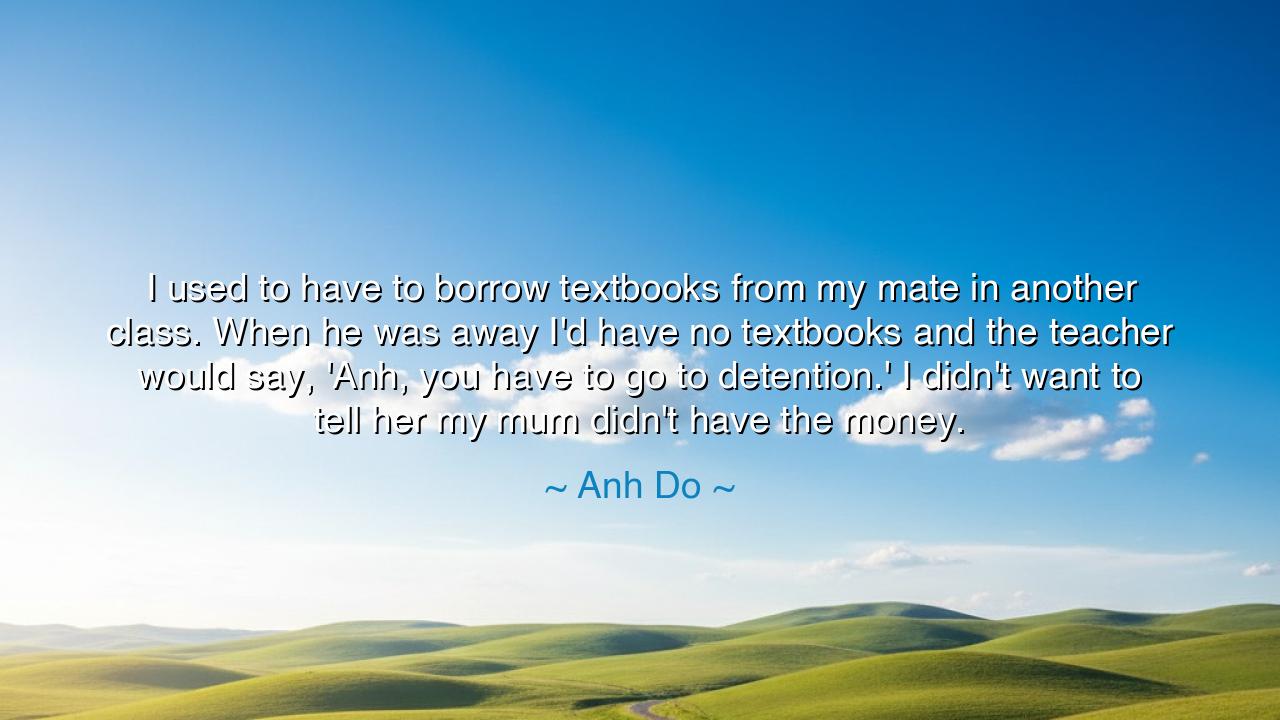
I used to have to borrow textbooks from my mate in another
I used to have to borrow textbooks from my mate in another class. When he was away I'd have no textbooks and the teacher would say, 'Anh, you have to go to detention.' I didn't want to tell her my mum didn't have the money.






Hear the voice of Anh Do, who remembers the hardships of his youth with honesty and humility: “I used to have to borrow textbooks from my mate in another class. When he was away I’d have no textbooks and the teacher would say, ‘Anh, you have to go to detention.’ I didn’t want to tell her my mum didn’t have the money.” These words reveal not merely the story of one boy but the silent struggle of many, who carry the weight of poverty yet bear it with quiet dignity. Behind the laughter and creativity for which Anh Do is known lies a tale of sacrifice, shame, and resilience.
The origin of this pain lies in poverty — not chosen, but endured. A child in a classroom, longing only to learn, is punished not for rebellion or neglect, but for lacking what others take for granted. In his silence we hear the cry of pride and protection: he would not expose his mother’s hardship, though it meant taking the blame himself. This is the nobility of the poor — to shield their loved ones even when misunderstood, to swallow suffering rather than betray their family’s dignity.
In the image of the missing textbook, we see more than paper and ink. We see the symbol of opportunity, of access to knowledge, of the key to a better future. For some, a textbook is a tool; for others, it is a luxury beyond reach. Anh Do’s punishment for lacking one echoes the plight of countless children through history who were judged not for their character but for their circumstances. Here is the tragedy: that systems meant to nurture can sometimes wound, and that those in need of compassion often meet only discipline.
Consider the story of Abraham Lincoln, who in his boyhood had so few books that he walked miles to borrow them, reading by firelight late into the night. Like Anh Do, he faced poverty’s barriers, but his hunger for learning could not be extinguished. From those meager beginnings, he rose to become a voice for liberty and unity. Both stories remind us that greatness often grows not from abundance but from lack, not from ease but from hardship. The missing textbook, the scarce book by firelight — these are the crucibles in which leaders are forged.
The meaning of Anh Do’s words is both sorrowful and heroic. They show us the cruelty of misunderstanding, when a teacher sees laziness where there is sacrifice, negligence where there is silent suffering. Yet they also show us the strength of the human spirit, which endures shame without surrender. To bear injustice in silence for the sake of protecting one’s family — this too is a kind of heroism. Out of such trials are born resilience, compassion, and the will to rise above circumstance.
The lesson for us is clear: never judge another too quickly, for you cannot see the burdens they hide. Behind a failure may lie poverty; behind defiance may lie pain; behind silence may lie dignity. To be wise is to look deeper, to ask before condemning, to show compassion rather than cruelty. And to those who endure hardship in silence: know that your suffering is not weakness but the soil from which strength may grow.
Therefore, take these practical actions: If you are a teacher, a leader, or a parent, look beyond appearances; ask what lies beneath the behavior before you judge. If you are a friend, offer what you can freely, as Anh Do’s mate lent his textbooks, for small kindnesses may carry another through great trials. And if you yourself suffer, hold to hope, remembering that many who were once poor in resources became rich in wisdom and courage.
So remember Anh Do’s words: the borrowed textbook, the silent shame, the undeserved detention. From such moments rise the storytellers, the leaders, the voices who remind us that hardship does not define us but refines us. Let his story be both a warning against quick judgment and an inspiration to endure. For even without the textbook, the true lesson was written upon his heart — that dignity, resilience, and compassion are worth more than gold.






AAdministratorAdministrator
Welcome, honored guests. Please leave a comment, we will respond soon